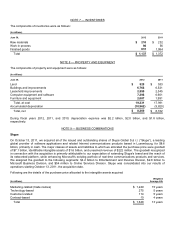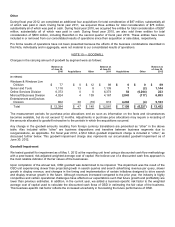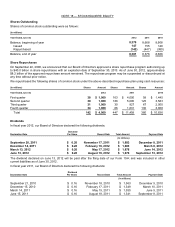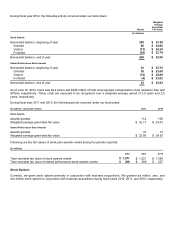Microsoft 2012 Annual Report Download - page 70
Download and view the complete annual report
Please find page 70 of the 2012 Microsoft annual report below. You can navigate through the pages in the report by either clicking on the pages listed below, or by using the keyword search tool below to find specific information within the annual report.
The three cases pending in British Columbia, Ontario, and Quebec, Canada have not been settled. In March 2010, the
court in the British Columbia case certified it as a class action. In April 2011, the British Columbia Court of Appeal
reversed the class certification ruling and dismissed the case, holding that indirect purchasers do not have a claim. The
plaintiffs have appealed to the Canadian Supreme Court, which will be heard in the fall of 2012. The other two actions
have been stayed.
Other Antitrust Litigation and Claims
In November 2004, Novell, Inc. (“Novell”) filed a complaint in U.S. District Court for the District of Utah (later transferred to
federal court in Maryland), asserting antitrust and unfair competition claims against us related to Novell’s ownership of
WordPerfect and other productivity applications during the period between June 1994 and March 1996. In June 2005, the
trial court granted our motion to dismiss four of six claims of the complaint. In March 2010, the trial court granted summary
judgment in favor of Microsoft as to all remaining claims. The court of appeals reversed that ruling as to one claim. Trial of
that claim took place from October to December 2011 and resulted in a mistrial because the jury was unable to reach a
verdict. In July 2012, the trial court granted Microsoft’s motion for judgment as a matter of law. Novell may appeal this
decision.
Government Competition Law Matters
In December 2009, the European Commission adopted a decision that rendered legally binding commitments offered by
Microsoft to address the Commission’s concerns about the inclusion of Web browsing software in Windows. Among other
things, Microsoft committed to display a “Browser Choice Screen” on Windows-based PCs in Europe where Internet
Explorer is set as the default browser. Due to a technical error, we failed to deliver the requisite software to enable that
display to PCs that came preinstalled with a version of Windows 7 called Windows 7 Service Pack 1. We did deliver the
requisite software to PCs running the original version of Windows 7 and earlier editions of Windows. Following notification
by the Commission of reports that some PCs were not receiving the update, we promptly fixed the error and advised the
Commission of what we had discovered. PCs that come preinstalled with Windows 7 Service Pack are now receiving the
Browser Choice Screen software, as intended. On July 17, 2012, the Commission announced that it had opened
proceedings to investigate whether Microsoft had failed to comply with this commitment. The Commission stated that if a
company is found to have breached a legally binding commitment, the company may be fined up to 10% of its worldwide
annual revenue.
Patent and Intellectual Property Claims
Motorola Litigation
In October 2010, Microsoft filed patent infringement complaints against Motorola Mobility (“Motorola”) with the
International Trade Commission (“ITC”) and in U.S. District Court in Seattle for infringement of nine Microsoft patents by
Motorola’s Android devices. Since then, Microsoft and Motorola have filed additional claims against each other in the ITC,
in federal district courts in Seattle, Wisconsin, Florida, and California, and in courts in Germany and the United Kingdom.
In April 2012, following complaints by Microsoft and Apple, the European Union’s competition office opened two antitrust
investigations against Motorola to determine whether it has abused certain of its standard essential patents to distort
competition in breach of European Union antitrust rules. In June 2012, we received a request for information from the U.S.
Federal Trade Commission (“FTC”) apparently related to an FTC investigation into whether Motorola’s conduct violates
U.S. law. The nature of the claims asserted and status of individual matters are summarized below.
International Trade Commission
The hearing in Microsoft’s ITC case against Motorola took place in August 2011 on seven of the nine patents originally
asserted in the complaint. In December 2011, the administrative law judge (“ALJ”) issued an initial determination that
Motorola infringed one Microsoft patent, and recommended that the ITC issue a limited
























